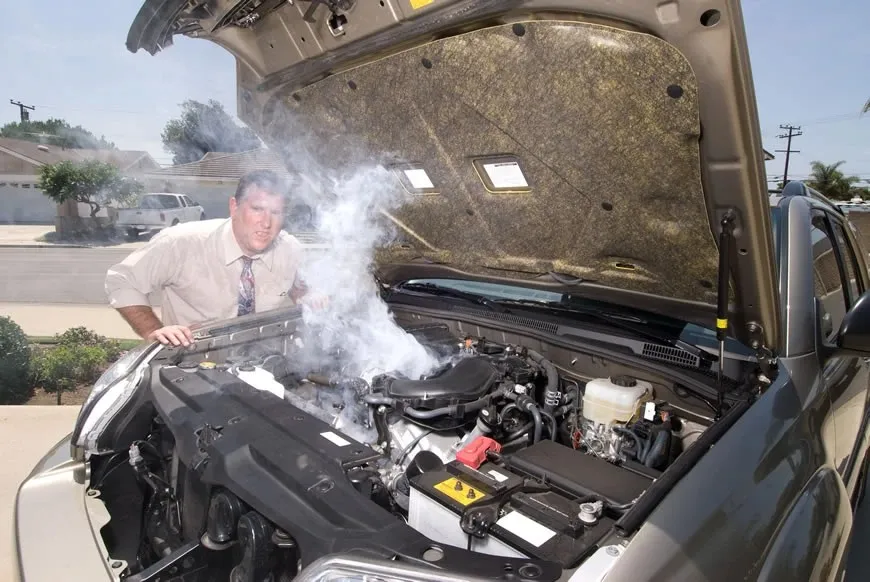What Causes a Car To Overheat?
When a car’s engine overheats, it can do some significant damage to your vehicle. It is essential to get to the bottom of the issue right away. There are several things that can cause overheating, so it will take some investigating to diagnose the problem.
A vehicle’s cooling system is rather complicated, so it helps to know how it works. Water and antifreeze are propelled through the engine’s head and block by the water pump. The thermostat and radiator fans regulate the temperature and circulation. The fans engage when they reach a specific temperature, which is monitored by a sensor that sends data to the car’s engine control unit.
How to Know if Your Car is Overheating
There are a couple of red flags that will tell you when your car is overheating. The first thing you should watch for is your temperature gauge beginning to work its way up into the red area. This will usually accompany a red warning light on your dashboard that says “Hot Engine” or something similar. You may also see some white smoke seeping out from under the hood of the car.
What to Do If the Engine is Overheating
If you are driving down the road and your engine overheats, you will need to act quickly to cool it down. Driving a car while the engine is overheating can cause severe and expensive damage to your vehicle. Look for a safe place to pull over and shut off the air conditioner right away, because it makes your engine work overtime. You should also turn on the car’s heater to draw excess heat away from the engine.
Once you are pulled over, put your car in park or neutral and then rev up the motor. This will make your water pump and fan work faster, pulling cooler air and water from the radiator. This boost of circulation will cool your engine down more quickly. While you’re at it, open the hood carefully, being cautious of escaping steam. This allows heat to escape while letting cooler air in to circulate through the overheated engine.
Don’t ever try to take the radiator cap off while the engine is still hot. Hot coolant will spray out because of the built-up pressure, and you will get burned. Wait until the motor is completely cooled off before attempting to add water or antifreeze back into the radiator or diagnose the problem.
Issues That Can Cause a Car to Overheat
Once your engine is completely cool, you can attempt to diagnose and repair the problem.
Leak
It’s possible that there’s a leak somewhere in your coolant system, allowing your water and antifreeze to leak out. Your mechanic will need to locate the leak and repair the issue.
Low Coolant Levels
Low coolant levels are a serious issue because it can allow an airlock to form. An airlock is a bubble of air that prevents coolant from circulating properly. Maintaining proper coolant levels should be part of your regular vehicle maintenance schedule.
Blocked Hose
Hoses can become blocked, loose, or even detach over time. If you notice that coolant levels are low frequently, there’s a good chance this is your problem. Have your mechanic check your hoses and address the issue.
Broken Water Pump
The water pump has the critical job of circulating water and coolant through your vehicle’s cooling system. If your water pump fails or becomes damaged, the coolant won’t flow through the engine to pull heat away and cool it down.
Radiator Problems
As the coolant in your radiator gets old, it begins to deteriorate and can become contaminated with debris like rust or corrosion from the engine. These particles could clog up the radiator, reducing or blocking the flow of coolant to the engine, allowing it to overheat.
Stuck Thermostat
The thermostat opens and closes, controlling coolant flow and keeping the temperature within the normal range. A stuck thermostat is a common issue, and it can cause the engine to overheat by preventing hot coolant from flowing away from the engine.
Blown Head Gasket
The head gasket seals the connection between the cylinder head and the engine block. It keeps the oil flowing correctly, keeps combustion maintained inside the cylinder, and keeps the coolant separated. When the head gasket is blown, oil and coolant may mix together, causing severe issues for both systems. It may even allow oil into the cylinder causing a blown motor.
If your vehicle is overheating, it’s probably a good idea to have it towed to your mechanic right away. Driving it may cause even more damage and diagnosing the problem can be challenging. Ignoring the problem or just adding coolant every time you drive it could blow your motor.

